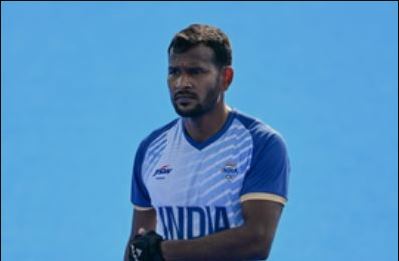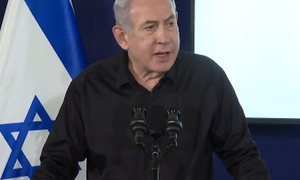Paris: He endured a couple of sleepless nights while dealing with the trauma of missing out on a crucial Olympics semi-final but Amit Rohidas is indebted to his teammates for not once letting him feel ostracized after his red card led to Indian team playing with 10 men for 42 minutes during its hockey quarter-final against Great Britain.
The Indian men’s hockey team secured a record-extending successive bronze medal here, their 13th Olympic hockey medal, despite the setback of Rohidas’ red card in the quarter-final against Great Britain, which led to his suspension for the semi-final.
“I really missed the semi-final because of the one-match suspension. It was such a crucial match,” the 31-year-old India’s defensive mainstay told PTI in an exclusive interview during the team’s felicitation at the India House here on Saturday.
“Pura country aur mere teammates mere saath the… Kabhi team se emotionally bahar hone nahin diya. Mera focus bas aagli match pe thaa (I knew the whole country and my teammates emotionally they never ever let me feel that I’m an outsider or sidelined. I was fully focused on our next match).”
The Indian first-rusher was penalised in the 17th minute of the quarter-finals for a swinging stick that inadvertently struck British forward Will Calnan in the face.
Although the on-field referee initially did not deem it a serious offense, the decision was upgraded to a red card after a video referral.
This led to a one-match suspension for Rohidas, sidelining him for the semi-final against Germany, which India narrowly lost.
Reflecting on the incident, Rohidas said, “I don’t know what people are saying outside, but I know as a player what I’ve gone through. It wasn’t intentional, and the referee’s decision is part of the game.”
Despite being down to 10 men, Indian goalkeeper PR Sreejesh put up a dogged show to take the match to the shootout, where he once made the difference with his heroics to take India into their second successive Olympics semi-finals in hockey.
“It gave me immense pride to win over our opponents in the shoot-out despite being reduced to 10 players. We showed our countrymen how we can fight despite the numerical disadvantage. It was not just once but twice we made records — beating Australia after 52 years, and winning with 10 players,” he reflected on their campaign.
Any regrets not being able to upgrade their Tokyo Olympics bronze to a gold or silver?
“Maybe the colour of the medal would have changed but it’s all destined you cannot change anything. Luckily we are not returning empty-handed. This is country’s medal.”
Having started off with a rusty win over New Zealand in a tough pool A, India grew from strength to strength match by match and their biggest win came when they defeated Australia 3-2 in their concluding league match.
The bronze medal match against Spain was a fitting farewell for veteran goalkeeper Sreejesh, who played his last international match capping a perfect show as the Indian ‘wall’.
“Sreejesh bhai may not be there on the pitch after the retirement, but he will always be there with us as a guide and mentor. I’m sure whoever takes his position under the bar, we will work together as a unit as we have been doing all this while. We will follow the same process,” he said.
Rohidas, who has been a key player in India’s defense, further spoke about the collective leadership within the team.
“There is no one leader in a team, 16 or 18 everyone contributes in the leadership role. We do it together. Our team does not have one leader. Yes, there is a designated captain, but it’s a team game. We all give our inputs, plan, and execute accordingly,” he emphasised.
Mike Horn’s Boot Camp: It was one hell of an experience
Before the Olympics, the team underwent a challenging three-day boot camp in Switzerland led by adventurer Mike Horn, who was previously associated with MS Dhoni and Co before their 2011 triumph and also the Germany team in the FIFA World Cup win in 2014.
Rohidas fondly recounted the experience.
“Accha bhi lag raha tha, aur upar se phaat bhi raha tha. Sab precautions thaa but agar kuchh ulta pulta ho jaata toh wahan chance nahin hai. (We had all the safety precautions but we also freaked out. It was like balancing between life and death),” he said.
“A magnificent and incredible three-day camping. It may look easy from outside, but only we knew what we went through while climbing on the cliffs and then the descent—up and down — and how to maintain balance. It really made our minds tougher, stronger,” he recollected.
PTI






































